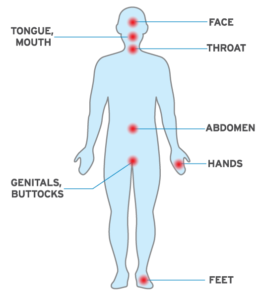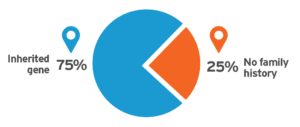What Is HAE?
Hereditary angioedema (HAE) is a rare disease that causes unpredictable attacks of swelling that typically occur in the face, throat, hands, feet, stomach (abdomen), and genitals. People with HAE experience recurrent episodes, or attacks, of swelling in the skin and/or mucous membranes. Depending on the severity of the disease, some people will have frequent attacks, while others may have few throughout the year.1 Physical exertion, stress, and trauma are commonly reported triggers of an HAE attack.2
During an attack, blood vessels release fluid, which causes swelling and pain. These attacks can be painful and affect one or more areas of the body at a time.
HAE management involves treating sudden attacks and if appropriate, preventing future attacks. You and your doctor should discuss if preventing attacks, or long-term prophylactic treatment, is right for you. Treating an attack as soon as possible after it starts may reduce the length of time it lasts.3
GENES AND HAE10
- Hereditary angioedema (HAE) is a rare disease affecting more than 1 in 67,000 people
- Approximately 75% of patients have a family history of the disease, while almost 25% do not
- Males and females are affected equally
- No known differences in prevalence among ethnic groups
COMMON SITES FOR AN ATTACK1

- The most common site of attacks is abdominal
COMMON PRODROMAL SYMPTOMS7,9
Symptoms can occur hours to days before an HAE attack, and can include unusual fatigue, rash, and muscle aches.
COMMON TRIGGERS2
Common patient-reported triggers can include physical exertion, mental stress, mechanical trauma, and infection.
Types of HAE
HAE can be broadly divided into 2 fundamental types:8
- HAE due to C1 inhibitor (C1INH) deficiency (HAE-C1INH)
- HAE with normal C1INH (HAE-nl-C1INH)
HAE-C1INH is further divided into 2 subtypes: Type I HAE and Type II HAE.
People with these types of HAE have a mutated C1 esterase inhibitor (C1-INH) protein. C1-INH is responsible for controlling the activity of other proteins, such as kallikrein and factor XIIa. The different types of HAE are related to the amount or functionality of C1-INH.5
Type I HAE: Due to C1 inhibitor deficiency, the body does not make enough C1-INH and it does not work properly. Type I is the most common, with 85% of people having this type.3
Type II HAE: The body makes normal, or even higher, amounts of C1-INH, but it does not work properly. 15% of people have Type II.3
References
- [1] Lumry WR, Castaldo AJ, Vernon MK, Blaustein MB, Wilson DA, Horn PT. The humanistic burden of hereditary angioedema: Impact on health-related quality of life, productivity, and depression. Allergy Asthma Proc. 2010;31(5):407-414.
- [2] Zotter Z, Csuka D, Szabó E, et al. The influence of trigger factors on hereditary angioedema due to C1-inhibitor deficiency. Orphanet J Rare Dis. 2014;9:44.
- [3] Maurer M, Magerl M, Betschel S, et al. The international WAO/EAACI guideline for the management of hereditary angioedema-The 2021 revision and update. Allergy. 2022;77(7):1961-1990.
- [5] U.S. National Library of Medicine. C1 esterase inhibitor. National Institutes of Health. Updated October 2, 2019.
- [7] Prematta MJ, Kemp JG, Gibbs JG, Mende C, Rhoads C, Craig TJ. Frequency, timing, and type of prodromal symptoms associated with hereditary angioedema attacks. Allergy Asthma Proc. 2009 Sep-Oct;30(5):506-11. doi: 10.2500/aap.2009.30.3279. PMID: 19843405.
- [8] Busse PJ, Christiansen SC, Riedl MA, Banerji A, Bernstein JA, Castaldo AJ, Craig T, Davis-Lorton M, Frank MM, Li HH, Lumry WR, Zuraw BL. US HAEA Medical Advisory Board 2020 Guidelines for the Management of Hereditary Angioedema. J Allergy Clin Immunol Pract. 2021 Jan;9(1):132-150.e3. doi: 10.1016/j.jaip.2020.08.046. Epub 2020 Sep 6. PMID: 32898710.
- [9] Kemp JG, Craig TJ. Variability of prodromal signs and symptoms associated with hereditary angioedema attacks: a literature review. Allergy Asthma Proc. 2009 Sep-Oct;30(5):493-9. doi: 10.2500/aap.2009.30.3278. PMID: 19843403.
- [10] Bernstein JA. Severity of hereditary angioedema, prevalence, and diagnostic considerations. Am J Manag Care. 2018;24(14 Suppl):S292-S298.


